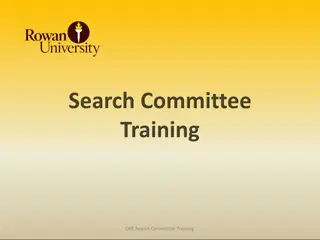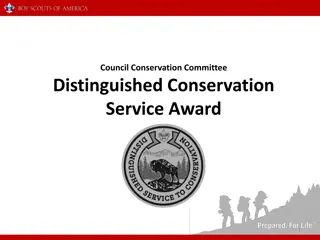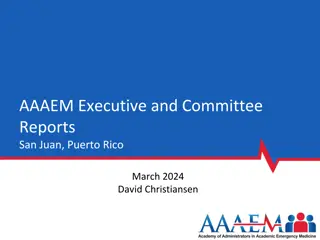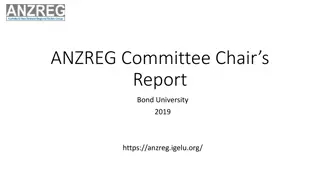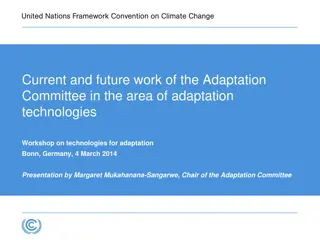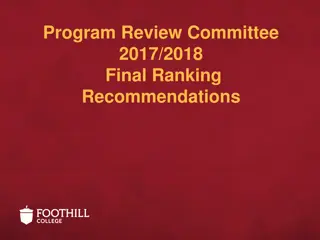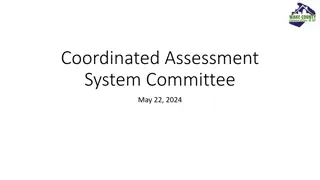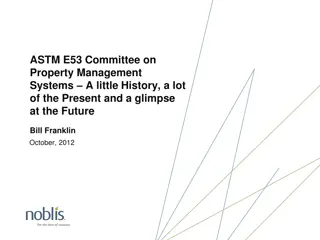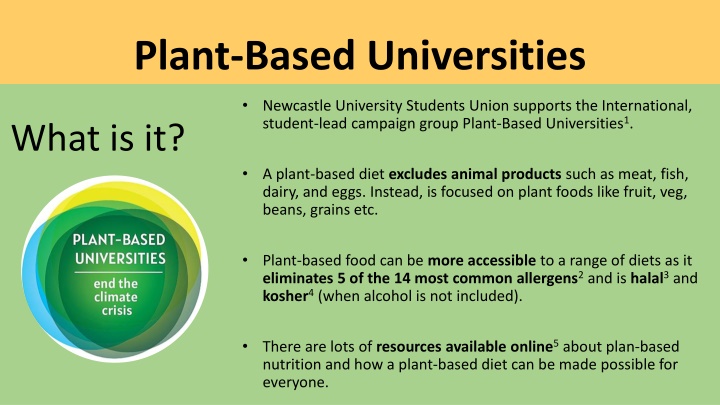
Newcastle University Supports Plant-Based Universities Campaign for Sustainable Food System
Newcastle University Students' Union endorses the Plant-Based Universities campaign, promoting a shift to a plant-based diet for environmental sustainability. Learn how this transition can reduce greenhouse gas emissions and contribute to a healthier planet.
Download Presentation

Please find below an Image/Link to download the presentation.
The content on the website is provided AS IS for your information and personal use only. It may not be sold, licensed, or shared on other websites without obtaining consent from the author. If you encounter any issues during the download, it is possible that the publisher has removed the file from their server.
You are allowed to download the files provided on this website for personal or commercial use, subject to the condition that they are used lawfully. All files are the property of their respective owners.
The content on the website is provided AS IS for your information and personal use only. It may not be sold, licensed, or shared on other websites without obtaining consent from the author.
E N D
Presentation Transcript
Plant-Based Universities Newcastle University Students Union supports the International, student-lead campaign group Plant-Based Universities1. What is it? A plant-based diet excludes animal products such as meat, fish, dairy, and eggs. Instead, is focused on plant foods like fruit, veg, beans, grains etc. Plant-based food can be more accessible to a range of diets as it eliminates 5 of the 14 most common allergens2and is halal3and kosher4(when alcohol is not included). There are lots of resources available online5about plan-based nutrition and how a plant-based diet can be made possible for everyone.
Newcastle University declared a climate emergency in 20196 Why is it needed? Transitioning to a 100% plant-based food system would reduce greenhouse gas emissions from agricultural production by 61%7 As well as freeing up 76% of global farmland for rewilding8 This land would draw-down as much carbon dioxide as is currently emitted through fossil fuels each year9. Beef Legumes Figure 1). Greenhouse gas emissions per 100g of protein from The United Nations Climate Action [online].
This transition means that catering for events need to have a greater proportion of plant-based options NUSU has committed to at least 50% plant-based catering at events. what does this transition mean for your club/society? Plant-based food can be equally as delicious and nutritious as animal-based foods so this shouldn't be a concern. Clubs/societies should not only take this opportunity to make their activities more sustainable but also investigate the inclusivity of their food choices for members including, but not limited to, students who are disabled, neurodivergent, have allergies, or eating disorders. There are lots of resources online4 about plant-based catering. Plant-Based!
References Figures: 1. United Nations (2024). Food and Climate Change: Healthy diets for a healthier planet. United Nations. [online] Available at: https://www.un.org/en/climatechange/science/climate-issues/food Footnotes: 1. Plant-Based Universities [online]. Available at: https://www.plantbaseduniversities.org/about 2. Allergy UK. Top 14 Food Allergens. [online]. Available at: https://www.allergyuk.org/types-of-allergies/food-allergy/top-14/ 3. Is All Vegan Food Halal? [online] Available at: https://www.iamgoingvegan.com/is-all-vegan-food-halal/ 4. Is All Vegan Food Kosher? [online] Available at: https://www.iamgoingvegan.com/is-vegan- kosher/#:~:text=All%20vegan%20food%20is%20basically%20kosher%E2%80%94but%20it%20depends 5. The Centre of Biological Diversity Catering to the Climate (biologicaldiversity.org) 6. Newcastle University. (2019). Newcastle University declares a climate emergency. [online] Available at: https://www.ncl.ac.uk/press/articles/archive/2019/04/climateemergency 7. Ortega, D.L., Sun, J. and Lin, W. (2022). Identity labels as an instrument to reduce meat demand and encourage consumption of plant based and cultured meat alternatives in China. Food Policy, 111, p.102307. doi: https://doi.org/10.1016/j.foodpol.2022.102307 8. Poore, J. and Nemecek, T. (2018). Reducing Food s Environmental Impacts through Producers and Consumers. Science, [online] 360(6392), pp.987 992. doi: https://doi.org/10.1126/science.aaq0216 9. Searchinger, T.D., Wirsenius, S., Beringer, T. and Dumas, P. (2018). Assessing the efficiency of changes in land use for mitigating climate change. Nature, [online] 564(7735), pp.249 253. doi: https://doi.org/10.1038/s41586-018-0757-z






